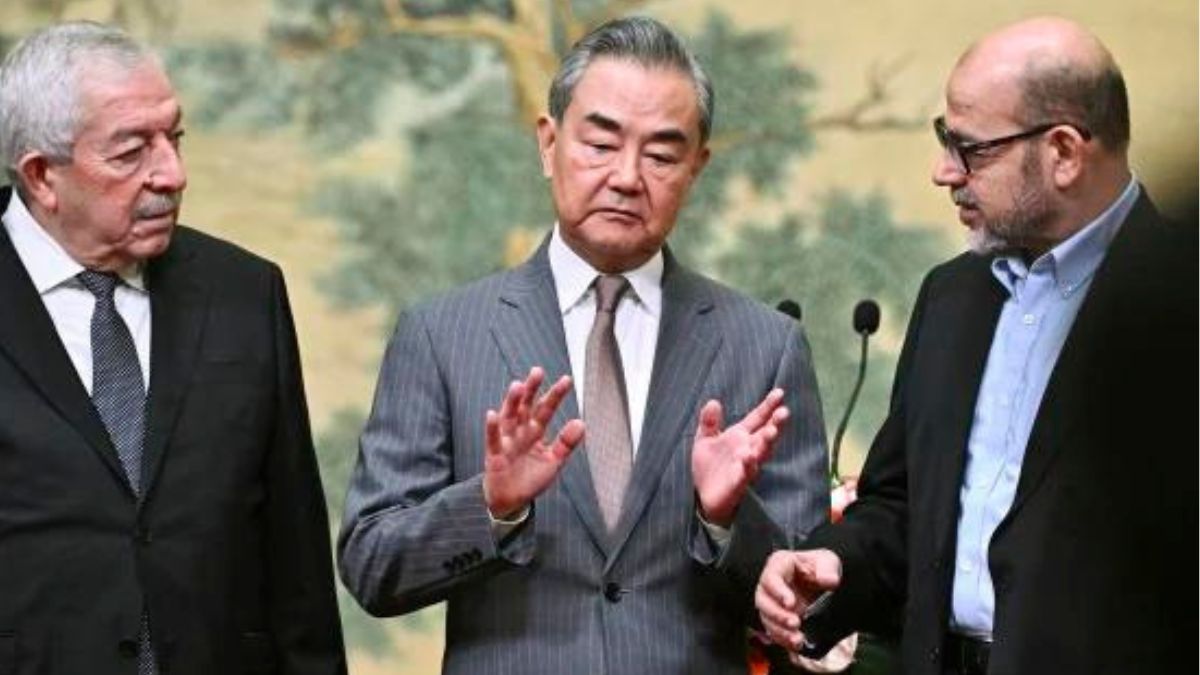China’s Tuesday announcement of a unity government agreement between Palestinian factions Hamas and Fatah has attracted global attention, with West Asia watchers doubting its actual outcome in the long run. The deal is meant to deliver a post-war Gaza administration but quickly rejected by Israel as it seeks to crush Hamas.
The deal, sealed at a dialogue in Beijing from July 21-23, aims to establish a post-war administration for Gaza. However, this ambitious diplomatic effort, dubbed the Beijing Declaration, faces immediate and formidable opposition from Israel, Western powers, and internal Palestinian divisions.
This follows China’s 12-point plan for establishing peace in Europe, ending the ongoing Russia-Ukraine war. China’s peace plan, though backed by Russia, has not received much attention from the West, which is involved in the war with the Nato security group monitoring the situation and member nations supplying ammunition and funds to Ukraine as it fights the Russian forces after the February 2022 invasion.
In 2023, China brokered a deal between arch-rivals Saudi Arabia and Iran, showing its intent to bid itself as a leading global power and an efficient mediator.
Can the Beijing Declaration be really a new hope for unity in Palestine?
Signed by representatives from 14 Palestinian groups, the Beijing Declaration represents China’s latest attempt to mediate the long-standing rift between rival factions. The agreement proposes to form a national reconciliation government to govern both Gaza and the West Bank post-war.
This initiative follows numerous failed attempts to bridge the divide that has persisted since Hamas seized control of Gaza in 2007 after a violent conflict with Fatah.
Impact Shorts
More ShortsHamas has welcomed the declaration, viewing it as a shield against external influences that conflict with Palestinian interests. Senior Hamas official Hussam Badran stated that the unity government would oversee Gaza’s reconstruction and pave the way for elections. Yet, the absence of a specific timeline for implementation raises questions about the agreement’s viability.
Challenges and Scepticism
Analysts remain sceptical about the practical implementation of the Beijing Declaration. The deep-seated enmity between Hamas and Fatah is a significant hurdle.
Additionally, Western opposition to Hamas’s participation in governance complicates the situation further. Commentators cited in media reports have said previous agreements had failed to materialise without U.S. approval. He dismissed the Beijing talks as a “celebratory event” unlikely to resolve the profound divisions in just three days.
Israel’s response has been of unequivocal rejection. Israeli Foreign Minister Israel Katz dismissed the agreement, accusing Palestinian President Mahmoud Abbas of aligning with Hamas, which he labelled as terrorists. Following the October 7 attack on Israelis, the relations between the two has worsened as the consequent and ongoing war has killed thousands in Gaza, governed officially by Hamas.
Katz asserted that Hamas would be defeated and that Israel’s security would remain under its control. Prime Minister Benjamin Netanyahu echoed this stance, vowing to dismantle Hamas and opposing its involvement in Gaza’s post-war governance.
How international community views China’s growing influence
The international community’s response has been mixed. The United States and its Arab allies have expressed support for a technocratic Palestinian Authority (PA) government to administer Gaza, excluding Hamas.
Conversely, China has been amplifying its advocacy for Palestinian causes in recent months. This mediation effort follows Beijing’s successful brokering of a peace deal between Saudi Arabia and Iran last year, highlighting China’s growing diplomatic influence in West Asia.
Chinese Foreign Minister Wang Yi has emphasised that the agreement’s most significant aspect was the formation of an interim national reconciliation government. This national unity government would not only manage Gaza’s reconstruction but also prepare conditions for future elections. However, the road ahead is fraught with obstacles, given the historical and political complexities.
Does history make us wise?
The Palestinian national schism traces back to the early 2000s, with attempts at reconciliation thwarted by ideological differences and external pressures. The current conflict between Israel and Hamas, which erupted on October 7, has exacerbated the situation.
Mediators have been striving to secure a ceasefire, with the contentious issue of Gaza’s governance post-conflict being a significant sticking point. Some reports have trashed the China-brokered peace deal as a rehash of several previous statements of reconciliation between the two principal rivals.
In one case, Algeria hosted 14 Palestinian factions as recently as 2022, getting them to sign an agreement. But none of those efforts has yielded any concrete movement in the Hamas-Fatah rift to date.
However, in what came as a surprise move, Hamas has shown willingness to forgo a direct role in Gaza’s post-war governance in China-mediated talks. It signals a potential shift in its strategy.
But Israel’s determination to prevent any Hamas involvement poses a substantial barrier. Netanyahu’s government, which firmly opposes Palestinian statehood, has consistently rejected the idea of a revitalised PA taking over Gaza.
So, what’s in store for the Beijing Declaration?
The future of the Beijing Declaration remains uncertain. Implementing the agreement will require dealing with the intricate landscape of Palestinian politics and securing broader international acceptance amid a competition among several global powers to keep its hold on the region. The United States, Israel, and other key players’ stance on excluding Hamas will be a critical factor to determine what future holds for the Beijing Declaration.
China’s role as a mediator in the Israeli-Palestinian conflict, however, indicates China’s growing aspiration to emerge as the global mediator as it faces multiple challenges in economy, supply chains and geostrategy. Nonetheless, China is positioning itself as a central player in long-standing global affairs — a move that aligns with Beijing’s broader strategy of expanding its influence through diplomatic and economic initiatives.


)

)
)
)
)
)
)
)
)



